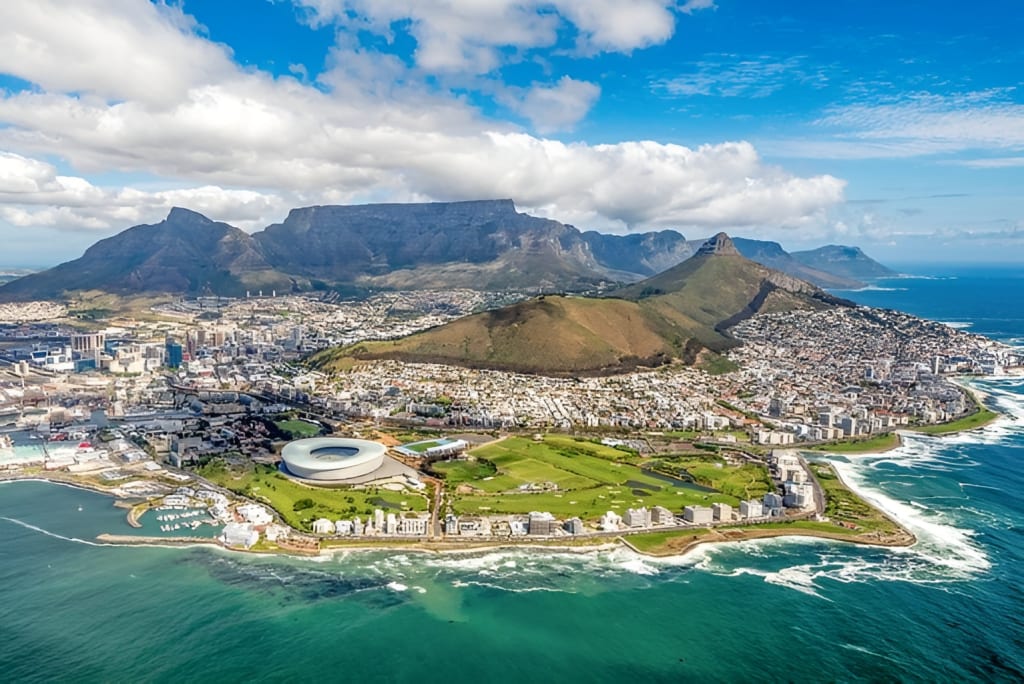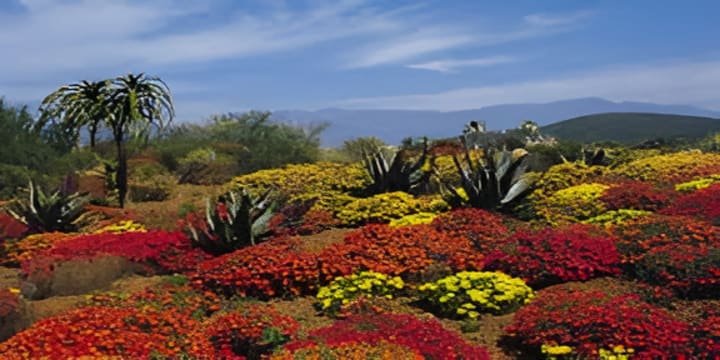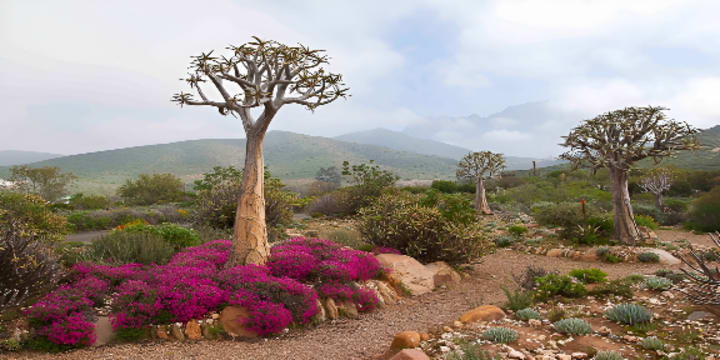
The city known for its breathtaking natural beauty and vibrant cultural scene, on the southwestern coast tip is none other than, Cape Town, South Africa. With its stunning coastal landscapes, majestic mountains, and rich cultural heritage, Cape Town has earned its reputation as the most beautiful city in Africa. Here are ten facts about Cape Town that highlight its unique charm and allure.
Fact 1: Rich History and Cultural Landmarks

Cape Town has a rich history and is dotted with cultural landmarks that tell the story of its past.
1. Castle of Good Hope: It served as a fortress, administrative center, and symbol of colonial power in the 17th Century. Today, it's a museum that offers a window into the city's colonial past.
2. District Six Museum: The District Six neighborhood was once a vibrant and diverse community, but it was declared a "whites-only" area, resulting in the displacement of thousands of residents. The museum tells the stories of those affected by this injustice.
3. Bo-Kaap: This historic neighborhood is famous for its brightly colored houses and cobblestone streets. It has a strong Cape Malay cultural heritage and is known for its cuisine, traditions, and contributions to Cape Town's diversity.
4. Slave Lodge: Originally built as a slave lodge in the 17th century, this building now houses the Iziko Slave Lodge Museum. This museum explores the history of slavery in South Africa and its impact on the country's cultural landscape.
5. Greenmarket Square: This public square has a vibrant market where visitors can find a variety of crafts, art, and curios.
Fact 2: Diverse Cultural Heritage

Diverse, is the word that describes the cultural heritage of Cape Town, with a rich blend of African, European, and Asian influences. This can be seen in the architecture, cuisine, and traditions of the city.
1. Architecture: The city boasts a mix of architectural styles, including Cape Dutch, Victorian, Georgian, and Islamic influences.
2. Cuisine: The city's cuisine is a fusion of various culinary traditions. Cape Malay cuisine, for instance, is a blend of Indonesian, Indian, and African flavors, resulting in dishes like bobotie (a spiced minced meat dish), samoosas (savory pastries), and bredie (stew). Seafood is also a prominent feature of Cape Town's cuisine.
3. Traditions and Festivals: The Cape Town Minstrel Carnival, recognized as the "Tweede Nuwe Jaar" (Second New Year) procession, is a dynamic celebration that honors Cape Town's rich Cape Malay heritage. This festive occasion is marked by vibrant displays of music, dance, and culture that bring the city to life. Other festivals, such as Diwali, Eid, and Chinese New Year, highlight the city's Asian influences.
4. Languages: While English is widely spoken, Afrikaans, Xhosa, and other African languages are also prevalent.
5. Arts and Music: Jazz music, in particular, has a strong presence, and venues like the Cape Town International Jazz Festival attract both local and international talent.
Fact 3. Cape Floristic Region

Situated within the geographically confined Cape Floristic Region (CFR), Cape Town stands as a unique enclave that boasts an extraordinary floral diversity. Recognized as the planet's smallest yet most diverse floral region, the CFR is a testament to the beauty and richness of Earth's biodiversity. Within this exceptional region, a multitude of plant and animal species find their habitat, showcasing remarkable levels of endemism. This signifies that many of these species are found exclusively within this particular area, underscoring the distinctiveness and importance of the Cape Floristic Region's biodiversity.
1. Biodiversity Hotspot: The CFR covers a relatively small area, but it contains an incredible diversity of plant and animal species, many of which are found nowhere else on Earth.
2. Endemic Species: A significant portion of the species found in the CFR are endemic, meaning they are found nowhere else in the world.
3. Animal Diversity: The diverse range of habitats within the CFR supports a variety of animal species, including mammals, birds, insects, and reptiles.
4. Conservation Importance: Several areas within the region are protected as national parks and nature reserves. The CFR's designation as a biodiversity hotspot underscores the need for its conservation.
5. Threats: Despite its importance, the CFR is under threat from various factors, including urbanization, agriculture, invasive species, and climate change.
Fact 4: Cape Peninsula - A Nature Lover's Paradise

Cape Town's Cape Peninsula is a nature lover's paradise, offering a diverse range of natural landscapes and wildlife. From the mountain ranges of Table Mountain National Park to the pristine beaches of Mesa Bay, the Cape Peninsula boasts an incredible array of natural beauty.
Here's a closer look at some of the natural attractions at Cape Peninsula
1. Beaches: The Cape Peninsula is known for its beautiful beaches of golden sands, clear waters and penguins.
2. Hiking Trails: The Cape Peninsula offers a plethora of hiking trails suitable for various skill levels.
3. Wildlife: Cape Peninsula is home to a variety of wildlife. Baboons, chacma baboons in particular, and various bird species are often seen in the national park.
4. Chapman's Peak Drive: This picturesque coastal road is not only a scenic drive but also a popular route for cycling and enjoying the natural beauty.
5. Kirstenbosch National Botanical Garden: Kirstenbosch is a short drive from Cape Town which showcases a diverse range of indigenous plants in a beautifully landscaped setting.
Fact 5: Green Spaces and Biodiversity Conservation

Cape Town is known for its commitment to preserving green spaces and biodiversity conservation. With 35% green space and 21% urban green space covered by trees, Cape Town ensures that its natural environment is protected and maintained.
1. Green Space: These green spaces serve as recreational areas, wildlife habitats, and places for relaxation, contributing to the quality of life for those living in the city.
2. Urban Tree Cover: The presence of this diverse ecosystem plays a pivotal role in mitigating the urban heat island effect, enhancing air quality, and creating vital habitats for a multitude of bird and insect species. By providing natural green spaces and a balanced environment, the Cape Floristic Region contributes significantly to the overall well-being of the area and its inhabitants.
3. Biodiversity Conservation: The city's efforts to protect and manage its unique ecosystems, such as the Cape Floristic Region, are crucial for the survival of many plant and animal species found only in this area.
4. Community Engagement: Local residents, environmental groups, and stakeholders often collaborate with the city to ensure the responsible management and use of these spaces.
5. Tourism and Well-being: Parks, gardens, and natural reserves offer recreational opportunities for visitors, contributing to the city's tourism industry. Additionally, access to green spaces has been linked to improved mental and physical well-being for residents.
Fact 6: Endemic Plant Species

Cape Town houses four focal points of fynbos plant endemism, showcasing the city's unique flora. These plant species can only be found within the city's borders, making Cape Town a haven for plant enthusiasts and researchers alike.
1. Four Centers of Endemism: These areas are botanical treasure troves, each with its own unique collection of plant species that have evolved to thrive in the specific microclimates and soil conditions of their respective locations.
2. Scientific Significance: Studying these endemic plant species provides insights into the process of speciation (the formation of new species) and the factors that contribute to the development of such high levels of endemism.
3. Conservation and Management: Protecting these unique areas helps preserve the genetic diversity of these endemic species and the ecosystems they inhabit. Conservation also safeguards the habitat for a variety of animal species that depend on these plants for food and shelter.
4. Tourism and Education: Nature enthusiasts, botanists, and those interested in biodiversity often visit these areas to experience the beauty of the local plant life and to learn about the ecological significance of fynbos.
Fact 7: Stunning Coastal Scenery

Cape Town is known for its stunning coastal scenery. From the rugged cliffs of Cape Point to the picturesque beaches of Camps Bay, breathtaking views of the city's iconic Table Mountain and the Atlantic Ocean can be seen.
Cape Point visitors can take in panoramic views from the lighthouse and explore the surrounding nature reserve, which is home to diverse flora and fauna.
1. Atlantic Seaboard: The stretch of coastline known as the Atlantic Seaboard offers stunning vistas and pristine beaches.
2. Clifton Beaches: A series of four sheltered beaches known as Clifton Beaches are famous for their clear waters, golden sands, and proximity to the city.
3. Llandudno Beach: Nestled between granite boulders, Llandudno Beach offers a more secluded and serene beach experience.
4. Hout Bay: This charming coastal village offers a picturesque harbor surrounded by mountainous terrain.
5. Bloubergstrand: It's a popular spot for kite surfing and beach activities, with the mountain serving as a stunning backdrop.
6. Sunset Views: The combination of the ocean, the cityscape, and the mountains creates a truly magical atmosphere during the golden hour.
Fact 8: Outdoor Activities Galore

Cape Town offers a plethora of outdoor activities for adventure enthusiasts. There is no shortage of exciting outdoor adventures in Cape Town.
1. Hiking: There are several trails of varying difficulty levels, catering to both experienced hikers and beginners. The views from the summit are truly breathtaking.
2. Surfing: Muizenberg Beach is famous for its gentle waves, making it an ideal spot for novice surfers to learn and enjoy the sport. For more experienced surfers, spots like Noordhoek and Llandudno offer bigger waves and a more challenging experience.
3. Cycling: The city and its surroundings offer numerous cycling routes for cyclists of all levels.
4. Paragliding: Experience the thrill of flying over Cape Town by paragliding from Lion's Head or Signal Hill.
5. Kayaking: Paddle along the coast or explore serene waters in places like Hout Bay or Simon's Town.
6. Abseiling: For an adrenaline rush, consider abseiling down Table Mountain. It's a unique way to experience the mountain's steep cliffs and incredible scenery.
7. Cape Winelands: Explore the beautiful Cape Winelands, known for its picturesque vineyards, wine estates, and charming towns like Stellenbosch and Franschhoek.
8. Zip-lining: Zip-lining at various locations around Cape Town across treetops and valleys provides a unique perspective of the landscape.
9. Rock Climbing: The sandstone cliffs around Cape Town offer a variety of routes for climbers.
Fact 9: Robben Island

This UNESCO World Heritage Site, which once served as a political prison, held Nelson Mandela in captivity for a duration of 18 years. Today, it stands as a powerful symbol of South Africa's relentless struggle for freedom, embodying the nation's journey towards liberation.
1. UNESCO World Heritage Site: In 1999, Robben Island was designated as a UNESCO World Heritage Site, a prestigious acknowledgment of its historical and cultural importance in the anti-apartheid struggle. This recognition solidifies the island's role as a living testament to the enduring battle against apartheid and its profound impact on South African history.
2. Guided Tours: Today, Robben Island is a popular tourist attraction, with guided tours.
3. Political Prisoners: The island housed a range of political prisoners who opposed the apartheid regime including Nelson Mandela.
4. Apartheid Museum: This musuem provides the context about apartheid, the anti-apartheid movement, and the struggle for justice.
5. Symbol of Freedom: Robben Island serves as a powerful symbol of the triumph of the human spirit over oppression. It has become a symbol of hope and a reminder of the importance of human rights and social justice.
Fact 10: Table Mountain - A Natural Wonder

Table Mountain, one of the most iconic landmarks in Cape Town, is a natural wonder that offers visitors panoramic views of the city and its surroundings.
1. Geological Significance: Table Mountain is estimated to be around 360 million years old and is composed mainly of sandstone.
2. Table Mountain National Park: It highlights the mountain's significance within the park and emphasizes its role in protecting the area's diverse ecosystems and biodiversity.
3. Breathtaking Views: Once at the summit, visitors are rewarded with panoramic views of Cape Town, the surrounding coastline, and the Atlantic Ocean
4. Flora and Fauna: Table Mountain is home to a diverse range of plant and animal species, including the famous silver tree and a variety of bird species.
5. Weather: The weather on Table Mountain can be quite changeable, with the phenomenon known as the "tablecloth" often occurring. This refers to the clouds that sometimes form around the mountain, resembling a tablecloth draping over its flat top.
About the Creator
iCi BuZz
Bleed on paper.
Upload the creative juices.
Replicate my inner self on blogs.
Sounds like you?
Welcome to my inky fraternity.
Yours truly,
iCi BuZz





Comments
iCi BuZz is not accepting comments at the moment
Want to show your support? Become a pledged subscriber or send them a one-off tip.